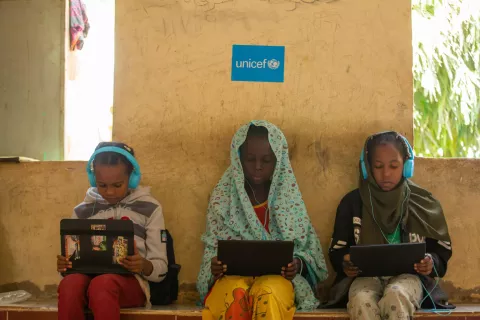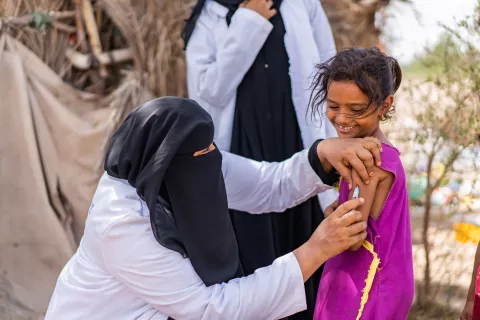In North Darfur, children are still able to laugh and play in the shadow of conflict
Last year, Ahmed Abdul Haman was forced to flee his village. Now he lives at Zamzam camp, where he can play football with friends and get the support he needs to rebuild a more stable life with his family.

ZAMZAM CAMP, North Darfur, Sudan, 5 July 2016 – After locals helped establish a refuge for newly arrived children at the Zamzam camp for the internally displaced, a steady stream of traumatized boys and girls began turning up at the front gates.
Some bore gunshot and shrapnel wounds, the result of attacks on their villages during the ongoing conflict which continues to ravage the region. At the Child Friendly Space (CFS) established by UNICEF with support from the Consolidated Emergency Response Fund (CERF) some children come in crying, others silent, unable to speak.
The worst affected, according to Ahmed Kakum, a Child Protection Officer with Salaam Sudan UNICEF’s implementing partner, were unaccompanied children who had lost their families. “They would cry all the time”, he said. “Some of them had been shot during the conflict, some had lost eyes. Some were not even able to talk.”
Ahmed helps run the facility, one of 48 Child Friendly Spaces in Zamzam that have been established by Salaam Sudan, a local NGO supported by UNICEF.
Escape from violence
The Um Gaibo CFS, set up in 2015, caters to around 340 boys and girls aged 6 to 14. Three staff work on-site, two animators who help coordinate activities and one psycho-social support worker.
A typical day at the CFS includes singing, art sessions and traditional storytelling – all designed to keep the children occupied in a safe, happy environment, and take their minds off the horrors of conflict. For some of the boys and girls though, this can be a difficult, drawn out process.
“Many of the children are traumatized by the conflict”, said Ahmed. “Sometimes when we give them paper to draw on, they draw the trucks and planes which were attacking their villages.”
In order to help the most severely affected cases, the CFS offers psycho-social support. “All of these children come from a place of war, and many of them are traumatised,” said Ahmed.
“Here they can get a psycho-social support worker to help address the issues that arise from what they have seen. They can get help to change their life from a bad one to a good one.”
Glimpse of a more stable life
Ahmed Abdul Haman is one of the children who has benefited from the services at Um Gaibo CFS. The 16-year-old was forced to flee fighting last year near his home village in Jabal Marra, a region in central Darfur that has been hit hard by the conflict.
“I come here so I can play football with my friends”, he said, sitting on the sandy floor of one of the CFS.
Ahmed, who has two sisters and one brother, is just one of hundreds of children scattered throughout Zamzam who are being offered a glimpse of a happier, more stable life through the UNICEF-supported CFS programme.
Now safe from conflict, he is free to enjoy the rights taken for granted by millions of boys and girls around the world. He can let his mind dwell on his favourite football team, Atletico Madrid, without being disturbed by the scream of artillery shells. And he can allow his thoughts to wander, towards the career in medicine that he would eventually like to enter.
“It’s important for children like Ahmed to get support from the CFS”, said Ahmed Kakum. “For example, by giving them psycho-social support, we can help them recover from what they have witnessed and eventually go to school.”



